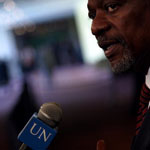
[In his speech in the Middle East] Obama position[ed] himself between two extremes, rejecting both for a shining synthesis. Shockingly, he at times defined the extremes as his own country and its enemies. On the one hand, America played a role in the overthrow of an Iranian government in the 1950s; on the other, the Iranian government has killed Americans for decades. So we're all to blame — can't we just get along? Some passages were so open to interpretation that they constituted rhetorical Rorschach tests. When Obama exhorted Palestinians to heed the example of peaceful protesters around the world, was it a lyrical yet pointed condemnation of decades-long Palestinian terrorism? Or was the comparison of their plight to that of blacks in segregationist America and in apartheid-era South Africa a profoundly delegitimizing slap at Israel? – NY Post
Dominant Social Theme: Obama provides comforting words to the Arab street.
Free-Market Analysis: Now we're not going to suggest that the Post lifted our story, only that we believe we provided our readers with the above analysis three days sooner and with a broader frame of reference. Why is this important? It buttresses a serious point, one we've made previously: The mainstream press is in trouble because its journos cannot write as honesty or as efficiently as 'Net writers and bloggers. Now the Post has provided case studies.
Background … This Saturday past, NY Post columnists in syndicated commentaries (see below and above) covered (first) Obama's Middle East speech and (second) scaremongering tactics of Green environmentalists. We commented on much the same issues on Wednesday and Saturday. Above, we've excerpted a bit of NY Post commentary on Obama's speech and "synthesis." Here's an excerpt from the piece that ran in the Bell on June 4, three days earlier.
The emergence of President Obama's Muslim roots … With well over a billion faithful around the world, the Muslim religion remains somewhat impervious to Western influence and corporate culture. Thus, for many decades, the big problem for the Western monetary elite, assuming it seeks additional influence (and it likely does), is how to begin to assimilate a massive group of peoples, tradesmen, tribesmen, etc. who have never been especially prone to Western sociopolitical homogeneity. Point three: Hegel. First, launch a series of wars to gain the attention of the leaders of these groups. Thesis. Now befriend certain Middle Eastern states and make them allies. Finally, support entities such as Dubai, which synthesize the "best" of Muslim and Western traditions – to show such a synthesis is feasible and even attractive. (Daily Bell)
Both our article and the Post's deal with Obama's apparent synthesis between competing Middle Eastern visions. But in the opinion of the writer of the NY Post editorial, Obama's synthesis worked as "public policy" because it [made] the intellectual and political isolation of Islamic extremists more … likely … it must be judged a success." Thus, the commentary takes the point of view that Obama's speech was effective because it had the potential for further injuring America's enemies, Islamic extremists.
We think this is a fairly narrow interpretation. In fact, the writer has to do some fairly energetic parsing – and even seems to throw up his hands at one point. "Some passages were so open to interpretation that they constituted rhetorical Rorschach tests," he writes in apparent frustration. Fortunately, the speech is finally wrestled to the ground and an appropriate summary extracted. … "Because it [made] the intellectual and political isolation of Islamic extremists more … likely … it must be judged a success."
OK, this may be an important issue, but the Bell has been created to provide you, dear reader, with a frame of reference broader than that. Those who want to be wealthy – in spirit, mind, body and pocketbook – must shed parochial (and nationalistic) orientations, in our opinion. (Is the monetary elite parochial?) The world is not always reducible to "us versus them."
No, Obama was not, as the Post has it, synthesizing an American position in order to isolate Islamofascists. We believe for numerous reasons that he was offering a third way to the Arab Street in order to consolidate Western political and military gains of the past bloody decades. It is a bigger issue than killing young men with a fundamentalist interpretation of the Koran. And Obama has been meticulously prepared to be a bigger guy than that. His speech, in fact, seemed to use a common promotion of the monetary elite: Create a thesis (a condition) and then an antithesis (a reaction) and finally a synthesis that blends the two conditions while moving the conclusion closer to wished-for (Western) position.

As we've written, The Daily Bell, like other electronic papers, does not suffer the constraints of the mainstream media. Our readers may disagree with our conclusions, but nonetheless, they often return and even spend a good deal of time with us. Mainstream newspapers may get this kind of attention, but less as the bankruptcies mount. It is the additional latitude that makes the difference.
